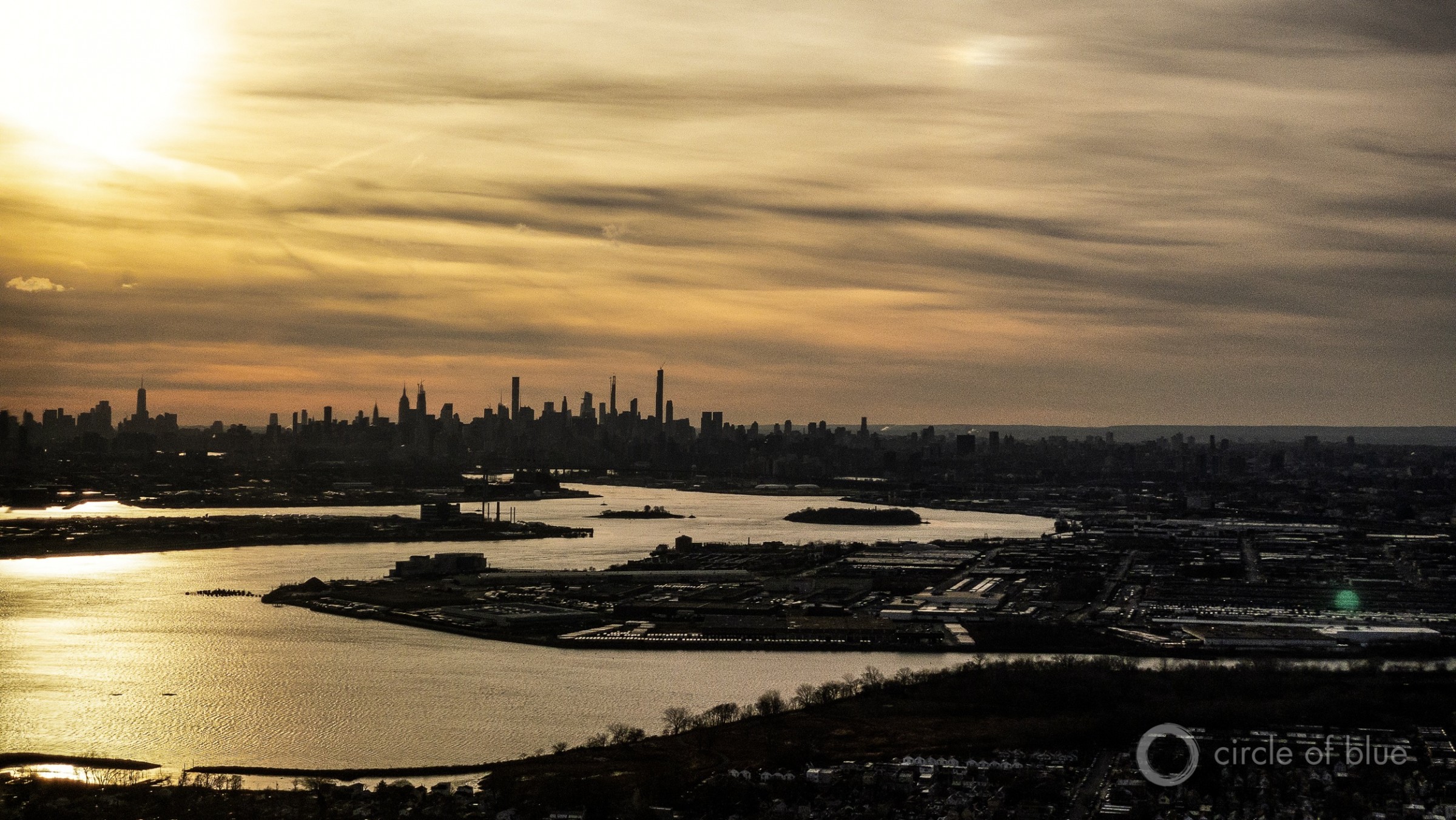Voters will decide on a constitutional amendment for environmental rights.

New York City skyline. Photo © J. Carl Ganter/Circle of Blue
- On November 2, New Yorkers will vote on amending their state constitution to include environmental protections, including clean water.
- At least a dozen other states are considering similar amendments.
- In Pennsylvania, where the constitution already recognizes environmental rights, the state Supreme Court has used the provision to strike down parts of state law.
By Brett Walton, Circle of Blue – October 26, 2021
New Yorkers have a chance to enshrine environmental protections in their state constitution, potentially reviving a legal movement that flourished in the United States a half-century ago.
Voters in the November 2 election will be asked whether to amend the state’s foundational document by inserting language that would protect individual rights to unimpaired ecosystems.
The text that would be added to the state Bill of Rights reads: “Each person shall have a right to clean air and water, and a healthful environment.”
The proposed amendment is a brief but powerful statement of principle, according to John Dernbach, a law professor at Widener University Commonwealth Law School.
“How many words protect freedom of speech?” Dernbach told Circle of Blue. “It doesn’t need to be long. The point is it’s in the Constitution.”
A Siena College Research Institute poll conducted at the end of June found considerable support for the proposal, with 80 percent of respondents saying they were in favor and only 12 percent opposed. A coalition of local, state, and national environmental groups is leading the support campaign.
The amendment was placed on the ballot because it passed the New York Assembly and Senate in consecutive sessions. It was supported in the Democratic-majority Legislature by large margins, passing with 76 percent of the vote in the Senate and 82 percent in the Assembly.
If New Yorkers approve the amendment, it would resurrect a constitutional environmental rights movement that arose in the 1970s, when public pushback against the health and ecological damages of unchecked industrial contamination became too great to ignore. In the same decade that the federal government created the U.S. Environmental Protection Agency and passed landmark environmental laws to protect air, land, and water, state governments began to secure in their constitutions those same rights for individuals.
Illinois, Pennsylvania, Montana, Massachusetts, and Hawaii adopted some form of environmental protection in their constitutions in the 1970s. Rhode Island followed in 1987, and was the last state to do so.
The legal arena was not completely fallow, though. California enacted a state law in 2012 acknowledging the human right to water and sanitation. Meanwhile, a parallel movement to grant legal rights to nature gained steam, earning a victory most recently in Orange County, Florida, where voters in 2020 approved a rights-of-rivers amendment to the county charter.
Dernbach told Circle of Blue that these amendments act as a steadying force in state politics, for the reason that constitutions are more stable than policies and regulations, which can change from administration to administration. Constitutional provisions are also broader, filling gaps in state policy.
Though in some states they languished, these amendments are starting to be used as judicial instruments. The Pennsylvania Supreme Court, for instance, has invalidated state law on the grounds that it violated the constitutional right of its residents to have “clean air, pure water” and environmental preservation. In the landmark Robinson Township case, in 2013, the court struck down parts of a law designed to encourage oil and gas development in the Marcellus shale region.
According to Green Amendments for the Generations, an advocacy group, campaigners in more than a dozen states are eager to follow this legal path and are actively pursuing constitutional environmental amendments.
Rabbi Nina Beth Cardin is the director of the Maryland Campaign for Environmental Human Rights, a group that is working with lawmakers on an environmental constitutional amendment in that state.
Cardin told Circle of Blue that the problems of today cannot be met with small actions. “The environmental challenges we face, the environmental injustices we need to address are too great and the urgency is too great for us to properly respond granularly, bill by bill,” she said.
Cardin said that passage of the New York constitutional amendment “would provide wind in our sails.” Her group plans to introduce its version in the Maryland legislative session that begins in January 2022. If lawmakers approve, it would also need voter endorsement.
Passage of an amendment is a first step, Dernbach said. Just as important is recognition from the judiciary in subsequent rulings. Dernbach said that Pennsylvania’s courts did not take the environmental rights amendment seriously until the Robinson Township case, fearing that applying it broadly would halt economic development.
Brett writes about agriculture, energy, infrastructure, and the politics and economics of water in the United States. He also writes the Federal Water Tap, Circle of Blue’s weekly digest of U.S. government water news. He is the winner of two Society of Environmental Journalists reporting awards, one of the top honors in American environmental journalism: first place for explanatory reporting for a series on septic system pollution in the United States(2016) and third place for beat reporting in a small market (2014). He received the Sierra Club’s Distinguished Service Award in 2018. Brett lives in Seattle, where he hikes the mountains and bakes pies. Contact Brett Walton



